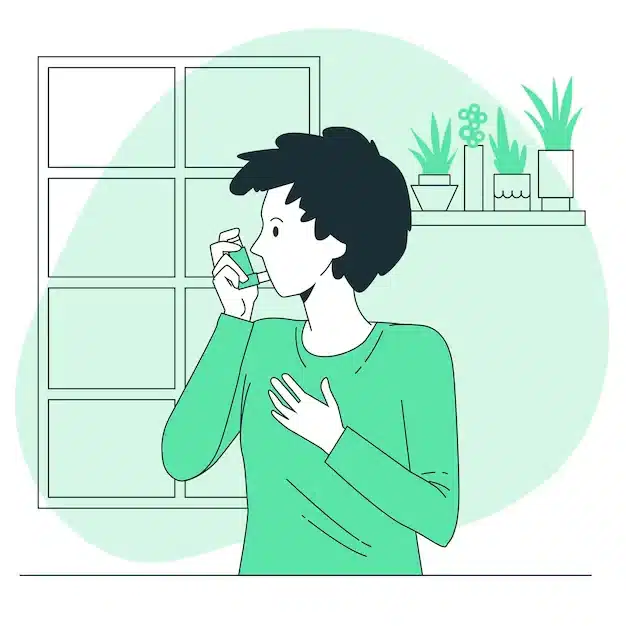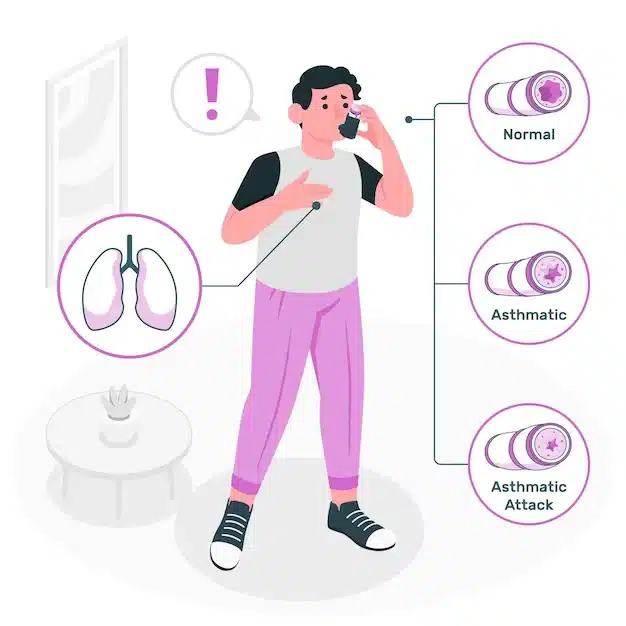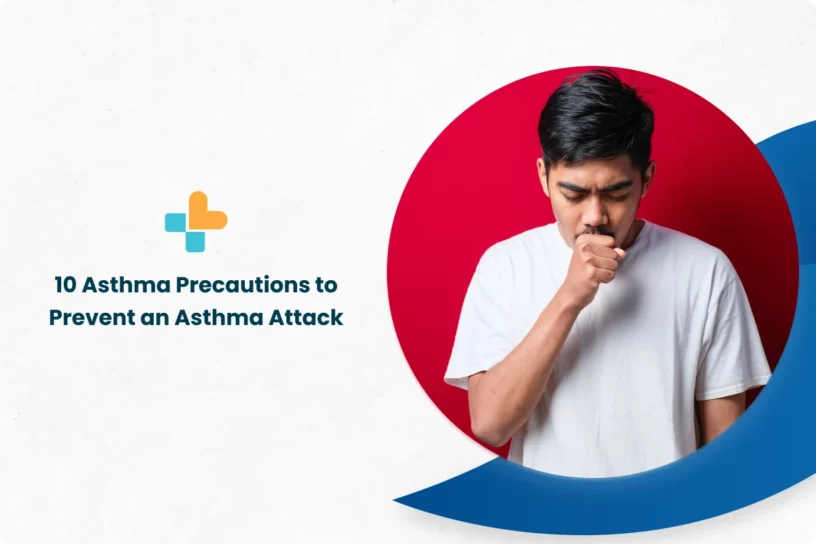Asthma is one of the most commonly occurring respiratory problems. Asthma is a condition that can happen to both adults and children. Asthma precautions are essential to follow to avoid an asthma attack. According to the reports by The Global Burden of Disease (GBD) (1990-2019), the total number of people with asthma in India is estimated to be 34.3 million. This accounts for approximately 13.09% of the global burden of asthma. Coughing, excessive mucus production, and difficulty in breathing or breathlessness are some of the symptoms of asthma.
This blog highlights information about asthma triggers and 10 asthma precautions to follow to avoid an asthma attack. So, please keep reading.
What is Asthma?
Asthma is a chronic, lifelong respiratory disease that has an effect on the airways, which are the tubes responsible to move air into and out of the lungs. Asthma leads to the narrowing and swelling of the airways. This leads to asthma symptoms such as shortness of breath or difficulty breathing, coughing, wheezing, etc.

What are the various asthma triggers?
The exact asthma causes are not known yet. However, researchers say that an asthma attack may occur as a result of the combination of genetic and environmental factors. Where the causes of asthma remain unknown, there are several substances, such as pollutants, smoke, cold air, fragrances, allergens, etc, that are known to trigger an asthma attack.
Why are asthma precautions important?
Asthma is a lifelong condition that cannot be cured. However, with the proper treatment approaches and a healthy lifestyle, asthma management is possible. Following asthma precautions makes asthma management easy, thereby making it easy for an asthma patient to be symptom-free and breathe easily.
10 asthma precautions to prevent an asthma attack
As a patient with asthma, who always finds themselves gasping for breath, wheezing, and coughing, there’s nothing best than following asthma precautions to prevent an asthma attack. Following these 10 asthma precautions can help in better asthma management and preventing any future asthma attack. So, what are these 10 asthma precautions? Let’s find out.
1. Know your asthma triggers
People with asthma often have hypersensitivity to certain asthma triggers. Upon coming in contact with these asthma triggers, the airways start to become narrow, thereby making it difficult to breathe. Some of the common asthma triggers include,
- Smoke
- Exercise
- Pollution
- Allergens
- Fragrances
- Certain health conditions
- Dust mites
- Pets and pests
- Molds
- Intake of certain medications
- Strong emotions like extreme stress
To keep an asthma attack at bay, it is essential to identify what is triggering your asthma attack, as this will help you in taking precautions to stay away from another asthma attack.
2. Keep Your Medications Handy
As an asthma patient, it is essential to always keep your asthma medications with you. Always carry the asthma medication or quick relief inhaler your doctor prescribed, especially when traveling or working out.
3. Watch out for allergens
If you have any allergies along with asthma, it is important for you to stay clear of the allergens triggering it, as allergens can trigger an asthma attack.
4. Keep Your Environment Clean
Keeping your surroundings clean will help you in preventing an asthma attack that may occur due to dust or pests. You must clean your home regularly, especially if you have pets. Vacuuming your home regularly can help in keeping your surroundings free of dust, pests, and animal dander, all of which are known asthma triggers.
5. Follow precautions when exercising
Since exercise may also trigger an asthma attack, it doesn’t mean you must not exercise at all. You can talk to your doctor about formulating a workout plan that works best for you.
6. Prevent catching a cold
It is best to avoid catching a cold to prevent an asthma attack. To prevent your risk of catching a cold, you must avoid coming in contact with people having the flu or cold. Ensure proper personal hygiene, like taking a warm bath or washing your hands thoroughly upon coming in contact with the personal items of a person having a cold.
7. Avoid smoke
Smoke exposure is one of the major asthma triggers in certain asthma patients. Hence, avoiding exposure to smoke from smoking, second-hand smoke, burning wood, etc, is important. It is also essential to quit smoking if you have asthma to prevent your exposure to smoke.
8. Stress management
Since extreme emotions such as stress can also trigger an asthma attack, stress management is important. You can try meditation, yoga, or even therapy to keep your emotions in check and relieve stress. You can also talk and get advice from your healthcare provider to learn about effective stress management.
9. Get a Home Peak Flow Meter
The purpose of using a meter to measure your lung function is to check the airflow in your lungs. When you are experiencing an asthma attack, your airways become constricted and narrow, which can be detected by the home peak flow meter. By using the home peak flow meter regularly, you can identify any changes in your lung function hours or even days before any asthma symptoms occur. This early warning system allows you to take the appropriate medication outlined in your treatment plan and potentially prevent the asthma attack from happening.
10. Get all your vaccinations done
To minimize the risk of experiencing asthma complications from different conditions such as the flu, etc, it’s recommended to get vaccinated for it. The flu virus can worsen asthma symptoms for an extended period, and individuals with asthma are more susceptible to flu-related complications such as pneumonia and hospitalization. Asthma diet: Foods to eat and avoid
Apart from these asthma precautions, it is also essential to monitor what you are eating. Although there is no solid evidence that certain foods may have an effect on the occurrence of an asthma attack, it is always good to eat a healthy diet, as not only does it help in managing asthma symptoms but also in maintaining good health in general.
It is important to note that food might cause allergies to flare up. Food allergies and food intolerances usually occur when the immune system overreacts to specific proteins in foods. Some people may get asthma symptoms as a result of this.

Foods to eat when you have asthma
Some of the foods that may help in improving lung health includes,
- Salmon, eggs, milk, and fortified orange juice as they are rich in vitamin D
- Green leafy vegetables, carrots, sweet potatoes, and broccoli as they are rich in vitamin A
- Magnesium-rich foods such as spinach, Swiss chard, and pumpkin seeds
- Herbal teas such as ginger team licorice tea, green tea, eucalyptus tea, etc
Foods to avoid in asthma
Some of the foods that are better to avoid may include,
- Dried fruits, lemon juice, and picked foods as they have sulfites that can worsen asthma
- Cabbage, fried foods, onions, etc. as these foods may cause acid reflux and gas
- Foods that are known allergens, such as wheat, dairy products, soy, etc
Frequently Asked Questions
1. What should I avoid when I have asthma?
You should avoid the various asthma triggers when you have asthma. Some of these asthma triggers include,
- Smoke
- Dust
- Pest
- Strong fragrances or odors
- Cold
2. What are 4 ways to manage asthma?
- There are several ways to manage asthma. The 4 ways include the following,
- Carrying your asthma medications with you all the time
- Avoiding exposure to smoke
- Avoiding being exposed to any asthma trigger
- Managing your stress
3. What is the best way to stop asthma?
The best way by which you can stop an asthma attack is to avoid your asthma triggers and follow the asthma treatment plan given by your doctor.
Which food is safe for asthma?
Although no specific “asthma diet” may ensure the perfect management of asthma, a healthy and balanced diet can promote respiratory health in general. Some of the foods safe to eat for asthma include,
- Fruits
- Green leafy vegetables
- Fishes
- Whole grains,
- Herbal teas
What drink is good for asthma?
Herbal teas, such as green tea, ginger tea, eucalyptus tea, black tea, licorice tea, etc., are good for asthma.
Also Read : Breathing Easy: Essential Asthma Precautions for Better Health
Conclusion
Asthma is a lifelong respiratory condition that can cause symptoms such as wheezing and trouble breathing. While the specific asthma causes are unknown, knowing the various asthma triggers can help prevent an asthma attack. Asthma precautions, when followed properly, along with a healthy diet, can help in managing asthma symptoms better.
At Ayu Health Network of Hospitals, we provide the best treatment plans and care to asthma patients at affordable costs. Our team also provides counseling and therapy to asthma patients that may help in relieving stress and anxiety, which may trigger an asthma attack. We also have a team of highly experienced nutritionists providing personalized diet plans to our patients.
Our Hospital Locations
General Surgery Hospitals in Chandigarh | General Surgery Hospitals in Bangalore | General Surgery Hospitals in Jaipur | General Surgery Hospitals in NCR | General Surgery Hospitals in Hyderabad
Our Doctors
General Surgery Doctors in Chandigarh | General Surgery Doctors in Bangalore | General Surgery Doctors in Jaipur | General Surgery Doctors in NCR | General Surgery Doctors in Hyderabad
About the Author

Dr. S. Goel
Dr. S. Goel is a renowned Internal Medicine Specialist currently practicing at Ayu Health, Bangalore. He is a Specialist in Internal Medicine, Diabetes HTN, Paediatric Care, and Family Medicine.




